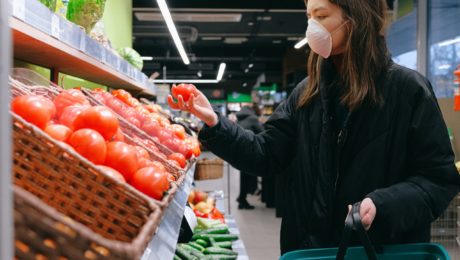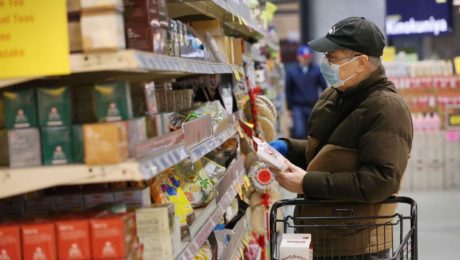Fermentation as Metaphor: A Conversation
Fermentation is more than just a food processing technique. Sandor Katz, today’s “godfather of fermentation,” expounds on the metaphorical significance of fermentation in his new book “Fermentation as Metaphor.”
“Fermentation is such a fascinating lens through which to look at the world and the incredible practicality of traditional cultural wisdom,” says Katz, fermentation author and educator, during a webinar hosted by The Fermentation Association. “In the English language, there’s a long tradition of describing things as fermenting that are not foods and beverages. We talk about a period of great musical fermentation, artistic fermentation, political fermentation, culture fermentation, we’ve applied it very widely. This book is really an exploration of that and a reflection of that.”
Katz spoke with his friend Mara King, chef and food professional, and they shared thoughts on how fermentation can be an unstoppable force for change.
“Fermentation is really teaching the world to embrace weird and funky things,” King says. “Take natural wines as an example. There’s a big movement in the world of wine making for using older techniques, using less chemical filtration and clarification methods. What you’re left with is a product that changes year to year and a product that has subtle notes of animal or leather, things you wouldn’t find before. We’re realizing a little bit of horrible is quite wonderful.”
Until the 19th Century, all wine was natural, Katz points out. Winemakers relied on organisms on the skins of the grapes for the flavor. Beer used to be a similarly natural product, but that’s changed as brewers today add yeast strains.
“It’s so much more interesting and complex of a flavor than the mass-produced beer where just a single organism is introduced. Fermentation really encourages people to expand their palates,” Katz says. “Funk is good. Funk makes things interesting. Funk is complexity. What I’ve learned by working with fermented tofu in food, working with natto in food, working with sumbala, the West African condiments that are natto-like, working with fish sauce, is [these ingredients on their own] might taste awful to you, but a little bit can introduce this je ne sais quoi into the flavor of a dish. Complexity is good and even flavors on their own that people might find scary or intimidating.”
The photography featured in “Fermentation as Metaphor” is unique — magnified microbes used in the creation of fermented food and drink. The images, captured with a scanning electron microscope, show the complexity of these microorganisms. Each structure is supported by a smaller structure, with membranes that are highly permeable.
“There continues to be a magic to fermentation, maybe in some ways even more so as fewer people have direct contact with their food. As there’s less wine making, cheese making, [or] baking in our lives that people actually see, these processes become more and more mysterious. [Mystery] has always been an aspect of fermentation because, until very recent times, there was never a clear, rational scientific understanding of what is going on. They were always seen as divine processes with lots of ceremony and ritual attached to them,” Katz adds. “Fermentation takes this neutral, plain food and gives it this really discernable, compelling flavor.”
Katz is already working on his next book, a fermentation travelogue book highlighting what he’s learning about fermentation in his worldwide travels. Katz and King previously filmed a series “The People’s Republic of Fermentation,” sharing the fermentation traditions of southwest China. They were supposed to travel to Taiwan and eastern China earlier this year, but the trip was cancelled due to the coronavirus pandemic. Next on Katz’s “to do” list — exploring the fermented cuisine of West Africa.
For anyone interested in purchasing “Fermentation as Metaphor,” visit Amazon or Bookshop.
- Published in Food & Flavor
Fermentation Booms During Pandemic
In a matter of days, the novel coronavirus outbreak dramatically changed grocery shopping. Empty grocery store shelves have become a ubiquitous symbol globally of home quarantine.
Sales exploded for pantry staples like dried beans (62.9%), powdered milk (126.3%) and rice (57.5%). But another grocery quarantine must-have item is emerging – fermented food and drink. Sales are up for kombucha (10.1%), natto is selling out in Japan, yogurt is selling out in Europe and pickle and sauerkraut sales in Russia are up 79%. Fermentation brands are reporting some of their biggest sales during the month of March, as much of the nation was forced into self-isolation to prevent the spread of COVID-19.
“For fermented food, it’s an interesting time. We’re an immune boosting type of food, so our sales are skyrocketing. We’ve had the best month we’ve ever had in business,” says Drew Anderson, CEO of Cleveland Kitchen and TFA board member. Cleveland Kitchen makes sauerkraut and fermented dressings and marinades. “It is bittersweet. Obviously, we want this virus to go away. But we’re seeing the fermentation industry as a whole, the one benefit is it’s driving a lot of trial. People say ‘I heard fermented food is supposed to be good for you, I’m cooking more, why not grab a pack of kraut.’”
Though sales are high, brands are changing their operation model. Rather than running two shifts of processing at Cleveland Kitchen, they’re down to one. Employees must take daily temperature readings before work, stop for mandatory handwashing breaks and use new Purell hand sanitizing stations.
“Sales are up overall, but we have had to implement our emergency sanitation protocols to continue production,” says Meg Chamberlain, CEO of Fermenti, LLC. The North Carolina-based brand sells a variety of vegetable ferments, teaches fermenting workshops and hosts annual the annual WNC Fermenting Festival. Their staff is under voluntary home quarantine – which means staff only goes from work to home. “Overall our company is proving resilient and we are hopeful to continue to provide Fermenti to our community.”
Because food production is considered essential business, licensed fermentation companies have not been forced to stop working during the coronavirus outbreak.
Aneta Lundquist, CEO of 221 B.C. Kombucha, has been posting videos to her Instagram stories of the Florida based kombucha processing facility. Lundquist says employees are working overtime to deliver orders.
“Our orders during the global pandemic have spiked. Consumers have gone full blown ‘healthy’ food during this health crisis,” she says. “Now is the time to make a switch from over-processed and denaturalized pseudo foods to real, natural and unprocessed foods that nourish our body, mind and spirit and help building a strong immunity.”
Lundquist adds customers need to “think of kombucha, kimchi, sauerkraut and other fermented fruits and vegetables as microbiome rock stars!…Always choose wildly fermented foods.”
“Remember it is about diversity and the quality of microorganisms, not just quantity. You can only achieve this by fermenting traditionally.”
Keenan Smith, CEO of Goodwolf Kefir in Portland, agrees. He says: “The probiotic and fermented space will increase as people have an increase in health awareness and want a better functioning immune system.” They are home delivering their kefir, and donating a
Brands are getting creative with their marketing, too. Goodwolf Kefir is home delivering kefir to the Portland area and donating a proceed of sales to their local food bank. Cultured South and Golda Kombucha have setup a pick-up fridge at their Atlanta location where customers can prepay for an order online, get a secret code to unlock the fridge and grab fermented food and drinks. Wild Kombucha in Baltimore is offering free, local, “no human touch” home delivery for their 12 pack bottles. 28 Mile Vodka & Distillery in Illinois have converted their distillery to make hand sanitizer that they call “Fool’s Gin.” The CEOs of Miyoko’s Creamery and Lifeway Kefir are both using the brands Instagram accounts to share recipes using their product.
Outside the U.S., though, different government rules are restricting fermentation brands from operating during the global outbreak. In India, Mountain Bee Kombucha has halted operations during a 21-day lockdown.
“There is no question that our business is impacted immensely, one for the fact that we are still quite small-scale which supplies directly to a handful of local grocery stores. Currently those grocery stores have been working at limited capacity and/or temporarily shut,” said founder and head brewer Honey Islam. “Another reason for lesser business in these times is due to the lack of awareness in the Indian market about fermented foods, especially kombucha. We are engaged in educating our customers as well as spreading awareness in the community via workshops, classes, 101 sessions, pop-ups, all these channels are education are currently disrupted which stalled our efforts in bringing kombucha awareness to the masses.”
Mountain Bee Kombucha is focusing on educating through Instagram videos and YouTube tutorials.
- Published in Business
Sales of Probiotic Products Rise
As the coronavirus outbreak continues to put health on the forefront of consumer’s minds, the sales of probiotic products are rising. GlobalData, an analytics company tracking grocery sales, notes that natto (fermented soybeans) were out of stock in Japan consistently since the outbreak. Sales of yogurt are also increasing.
“Consumers are more actively buying probiotic products. There will not be natto panic buying in Europe, but probiotic products claiming to improve the immune system are likely to grab consumers’ eye,” said Mitsue Konishi, senior innovation analyst at GlobalData.
Read more (Food & Drink Technology) (Photo by ABC News)
- Published in Business
Probiotics Build Stronger Bones
Probiotics are good for the bones, a new study finds. Older women who took probiotics had less bone weakening than women who did not take probiotics. Fermented foods rich in probiotics include pickled veggies (sauerkraut, pickles, kimchi), yogurt, kefir, kvass and natto.
Read more (New York Times)
- Published in Science
Dinner rush doesn’t stop even for daughter’s historic Winter Olympics performance
While Mirai Nagasu was nailing her historic triple axle during the Winter Olympics, her parents were finishing dinner service at Kiyosuzu, their Japanese restaurant in Arcadia, California. Mirai credits her creativity to her father, who makes imaginative sushi rolls. The fried natto (fermented soybeans) and the Mirai roll are customer favorites!
- Published in Uncategorized
- 1
- 2





